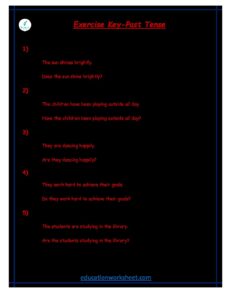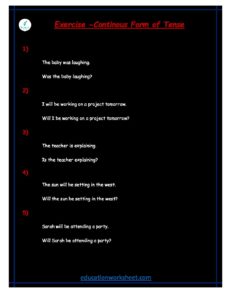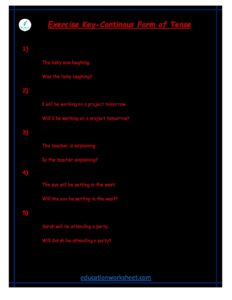changing continuous tense to positive and interrogative
changing continuous tense to positive and interrogative
Present Continuous Tense
The present continuous tense is used to describe actions or situations that are happening right now, at the present moment. To convert this tense from an affirmative statement to an interrogative one, you need to switch the subject and the auxiliary verb “am,” “is,” or “are.” Here are the basic steps and examples:
Affirmative:
- Subject + to be (am, is, are) + verb-ing + the rest of the sentence.
Examples:
- I am eating breakfast.
- She is watching a movie.
- They are studying for the exam.
Interrogative:
- To be (am, is, are) + subject + verb-ing + the rest of the sentence + ?
Examples:
- Am I eating breakfast?
- Is she watching a movie?
- Are they studying for the exam?
Past Continuous Tense

The past continuous tense is used to describe actions or situations that were ongoing in the past. Changing this tense to interrogative form involves switching the subject and the past form of the auxiliary verb “was” or “were.” Here are the steps and examples:
Affirmative:
- Subject + was/were + verb-ing + the rest of the sentence.
Examples:
- I was reading a book.
- He was playing the guitar.
- We were cooking dinner.
Interrogative:
- Was/Were + subject + verb-ing + the rest of the sentence + ?
Examples:
- Was I reading a book?
- Was he playing the guitar?
- Were we cooking dinner?
Future Continuous Tense

The future continuous tense is used to describe actions or situations that will be ongoing in the future. To change this tense to an interrogative form, swap the subject and the future form of the auxiliary verb “will be.” Here are the steps and examples:
Affirmative:
- Subject + will be + verb-ing + the rest of the sentence.
Examples:
- They will be traveling tomorrow.
- She will be working on a project.
- I will be studying all day.
Interrogative:
- Will + subject + be + verb-ing + the rest of the sentence + ?
Examples:
- Will they be traveling tomorrow?
- Will she be working on a project?
- Will I be studying all day?
Common Interrogative Words
When forming interrogative sentences in English, it’s essential to use question words like who, what, when, where, why, how, and which. These question words help you gather specific information in your interrogative sentences. Here’s how to use them in different tenses:
Present Continuous:

- Question Word + be (am, is, are) + subject + verb-ing + the rest of the sentence + ?
Examples:
- What are you doing?
- Why is she crying?
- Where are they going?
Past Continuous:
- Question Word + was/were + subject + verb-ing + the rest of the sentence + ?
Examples:
- When were you studying?
- What were they watching?
- Why was he shouting?
Future Continuous:
- Question Word + will + subject + be + verb-ing + the rest of the sentence + ?
Examples:
- How will you be traveling?
- Where will they be staying?
- When will she be arriving?
In summary, changing continuous tenses to positive and interrogative forms involves swapping the subject and auxiliary verbs. Whether you’re using the present continuous, past continuous, or future continuous tense, following these rules will help you construct grammatically correct interrogative sentences. Additionally, incorporating question words in your interrogatives allows you to gather specific information. By practicing these rules and examples, you’ll become more proficient in using continuous tenses in both affirmative and interrogative forms.

